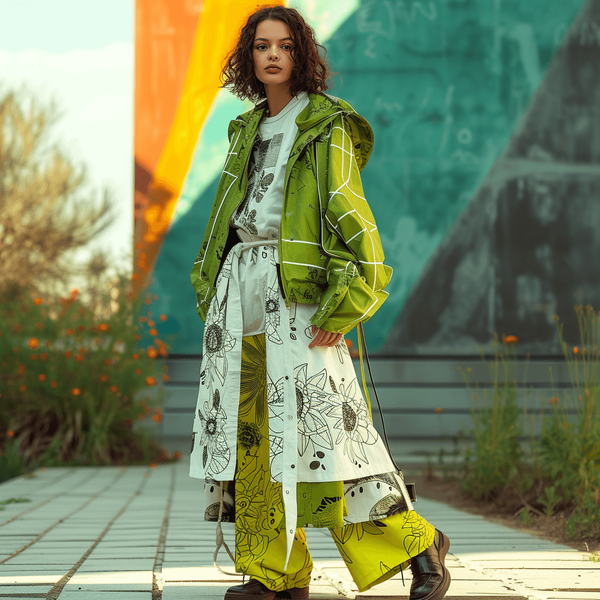Eco-conscious Consumers (2024): Driving Force of Sustainable Fashion

By Wildr Editor

Ever wondered how your shopping decisions could shape the future of fashion? Recent data reveals a significant swing towards eco-conscious buying, with half the respondents in PwC's Global Consumer Insights Pulse Survey saying they have become more eco-friendly during the pandemic.
This article explores the rising trend of eco-conscious buyers, focusing on its impact on sustainable fashion businesses and strategies brands can use to engage this market effectively.
Key Takeaways
- Recent data shows that half of global consumers have become more eco - friendly during the pandemic, leading to a rise in demand for sustainable fashion.
- Younger workers, particularly Millennials and Generation Z, are driving the demand for sustainable products and favoring sustainable fashion brands.
- Sustainable fashion is transitioning from being a trend to becoming mainstream, with 81% of people expecting companies to be environmentally conscious in their advertising and communication.
The Rise of the Eco-Friendly Consumer

The COVID-19 pandemic has had a significant impact on consumer choices, leading to an increase in demand for sustainable products, particularly among younger workers.
The Impact of the Pandemic on Consumer Choices
The pandemic changed the way people shop. Many started to care more about our planet. Half of global shoppers turned eco-friendly during this time, says a PwC survey. This shows a big shift in how they make choices at the store.
More than ever, people want products that don't hurt the environment. The most change came from millennials, both young and core groups. They led the way in shopping green during these hard times.
Younger workers' demand for sustainable products
Young workers want clothes that are better for our planet. Why? Because at the end of the day, it's our home and they and the future generations need to live in it. This group, made of millennials and Generation Z, think a lot about shopping choices when it comes to how it'll impact the planet.
Their wish for green products makes them drive the fashion industry to change its ways. Many of these eco-friendly consumers favor sustainable fashion brands more than others. These younger buyers also show that working at home has made them care more for our planet.
The Influence of Sustainable Fashion and what this means for brands
Sustainable fashion changes how brands do business. More and more people want eco-friendly clothes. Brands have to listen or lose customers. They need to make sure that they make clothes in a way that at the basic level does more good and less harm.
This means using less water and power to make the clothes. It also means making sure workers are safe and paid well. Some brands even use old clothes to make new ones.
People don't just want these things - they will pay more for them too. So, sustainable fashion can help brands get more money, as well as saving the earth at the same time.
Key Findings from Sustainability Surveys
Sustainability surveys reveal both the skeptics of sustainability and the advocates of eco-innovations, providing valuable insights into consumer attitudes towards sustainable fashion.
The Skeptics of Sustainability
Not everyone is on board with eco-friendly living. The PwC’s June 2021 Global Consumer Insights Pulse Survey shows that 44% of people had no opinion or cared less about sustainable shopping because they believe sustainable products cost too much.
Many of these skeptics are young folks who work away from home. They choose ease over the planet when they shop.
While many millennials have changed their consumption patters for more eco-friendly products, Gen Z’s green ideals don’t translate to dollars because they simply can’t afford them.
The Advocates of Eco-Innovations
Sustainable e-commerce business owners should pay attention to the advocates of eco-innovations. These individuals are passionate about finding new and innovative ways to protect the environment through their shopping choices.
They actively seek out eco-friendly products and services, looking for brands that align with their values. According to a survey, 81% of people expect companies to be environmentally conscious in their advertising and communications.
This means that businesses that prioritize sustainability will attract these advocates who can become loyal customers.
By highlighting your brand's eco-friendly initiatives and showcasing your sustainable products, you can capture the attention of these environmentally-conscious consumers and build a strong customer base.
The Transition from Trend to Mainstream

Sustainable fashion has transitioned from being just a trend to becoming mainstream. More and more people are embracing eco-consciousness in their shopping decisions.
This shift is driven by younger workers, particularly Millennials and Generation Z, who demand sustainable products. It's not just about protecting the environment anymore - it's about making a positive impact.
This transition to mainstream sustainability is evident in consumer behavior. Before the pandemic, 35% of respondents already chose sustainable products to help protect the environment.
Consumers are also taking action themselves, with 69% saying they're doing everything possible to minimize their carbon footprint.
In regions like Asia-Pacific, specifically Indonesia, Vietnam, and the Philippines, consumers reported being even more eco-friendly than the global average. This highlights the growing awareness and acceptance of sustainable practices across different markets.
As sustainable e-commerce business owners, it's crucial to recognize this transition and adapt your strategies accordingly by offering eco-friendly products that meet consumer demands.
Provide sustainably sourced options and communicate your environmental commitments clearly to customers through your marketing efforts.
Leverage social influence strategies such as encouraging sustainable behaviors and highlighting positive spillover effects can help engage with these increasingly conscious consumers effectively
How Companies are Responding
Companies are taking significant steps to respond to the growing demand for sustainable fashion. From leading with eco-innovations to leveraging the domino effect, they are finding ways to meet the needs of eco-conscious consumers.
To learn more about their strategies, read How to Start a Profitable Sustainable Fashion Business: A Step-by-Step Guide.
Leading with eco-innovations
Companies that prioritize eco-innovations are at the forefront of sustainable fashion. By developing and promoting environmentally friendly products and practices, these companies are able to meet the growing demand for sustainable options.
According to PwC's Global Consumer Insights Pulse Survey, 50% of consumers have become more eco-friendly during the pandemic. This presents a significant opportunity for sustainable e-commerce businesses to capture this market by leading with innovative solutions that reduce their environmental impact.
For example, companies can focus on sourcing materials from sustainable suppliers, implementing energy-efficient production processes, and using eco-friendly packaging. By taking proactive steps towards sustainability, these businesses can attract and retain eco-conscious consumers who value brands that align with their values.
Leveraging the domino effect
Companies can leverage the domino effect to encourage eco-conscious behavior among consumers. By highlighting the positive impact of sustainable actions, businesses can inspire others to follow suit.
For example, showcasing how one person's decision to purchase an eco-friendly product reduces carbon emissions and promotes sustainability can motivate others to make similar choices.
This ripple effect creates a sense of collective responsibility and encourages more widespread adoption of sustainable practices. Additionally, companies can collaborate with influencers or create partnerships with like-minded organizations to amplify their message and reach a larger audience.
Emotional vs Rational Appeal in Sustainable Fashion
Brands must understand the power of emotional and rational appeals in sustainable fashion to effectively engage eco-conscious consumers. Discover how these strategies can drive consumer behavior and foster a deeper connection between brands and their target audience.
The emotional appeal
Consumers are not only driven by facts and rationality when it comes to sustainable fashion, but also by their emotions. By appealing to their values, aspirations, and desires for a better world, brands can create a strong emotional connection with eco-conscious consumers.
For example, studies show that 81% of people expect companies to be environmentally conscious in their advertising and communications. This means that showcasing your brand's commitment to sustainability through powerful storytelling and impactful visuals can capture the attention and loyalty of these consumers.
Emphasizing the positive impact they can make by choosing sustainable fashion over traditional options is key. Letting them know how their purchase contributes to reducing greenhouse gas emissions, minimizing waste, or supporting fair trade practices allows them to feel like they're making a difference.
The rational appeal
Consumers are increasingly making rational choices when it comes to sustainable fashion. They are looking for evidence and facts that support a brand's environmental claims. It's not just about emotions anymore, but about tangible proof of sustainability.
For example, 69% of respondents in a survey said they were doing everything possible to minimize their carbon footprint. This means that as a sustainable e-commerce business owner, you need to provide clear information about your products' eco-friendly features and how they contribute to reducing environmental impact.
Showcasing certifications, transparent supply chains, and using sustainable materials can help build trust with these consumers who prioritize facts and rationality in their purchasing decisions.
Key Strategies for Brands to Engage Eco-Conscious Consumers

Utilize social influence, encourage sustainable habits, leverage the domino effect of eco-friendly choices, and appeal to emotions and rationality. Read more to discover how brands can effectively engage eco-conscious consumers.
Utilizing Social Influence
Sustainable e-commerce business owners can effectively engage eco-conscious consumers by utilizing social influence. Here's how:
- Partner with influencers: Collaborate with social media influencers who align with your brand's values and have a strong following of eco-friendly enthusiasts. Their endorsements can attract attention and encourage sustainable shopping habits.
- User-generated content campaigns: Encourage your customers to share their sustainable fashion choices on social media using branded hashtags. This not only creates a sense of community but also inspires others to make similar choices.
- Engage with eco-communities: Participate in online forums, groups, and discussions focused on sustainability and ethical fashion. Sharing valuable insights, tips, and information will position your brand as an authority in the industry.
- Collaborate with like-minded brands: Join forces with other sustainable businesses to create joint marketing campaigns or collaborative collections. This cross-promotion can help expand your reach and appeal to a wider audience.
- Support causes that matter: Align your brand with relevant environmental or social causes through partnerships or donations. By actively supporting these initiatives, you demonstrate your commitment to making a positive impact beyond just selling products.
Encouraging Sustainable Habits
To engage eco-conscious consumers and promote sustainability, sustainable e-commerce business owners can implement the following strategies:
- Provide educational content: Share information about sustainable practices and the environmental impact of consumer choices. Educate customers on how their habits can contribute to a greener future.
- Offer eco-friendly alternatives: Showcase products that are made from sustainable materials or produced using ethical practices. Highlight the benefits of choosing these options, such as reduced carbon emissions or support for fair trade.
- Promote recycling and waste reduction: Encourage customers to recycle packaging materials and provide instructions on proper disposal methods. Introduce initiatives like take-back programs or incentives for returning used products.
- Implement rewards programs and incentives: Reward customers who make sustainable purchases or engage in eco-friendly activities. Provide discounts, exclusive offers, or loyalty points to encourage them to continue their sustainable habits.
- Communicate transparently about your own sustainability efforts: Share information about your company's environmental initiatives, such as using renewable energy, reducing waste in operations, or supporting conservation projects. Transparency builds trust and shows customers that you align with their values.
Domino Effect of Eco-friendly Choices
When consumers make eco-friendly choices, it can have a domino effect that spreads positive impact throughout the sustainable fashion industry. By choosing to support brands that prioritize sustainability, consumers send a message to other companies about their expectations for environmentally conscious practices.
This encourages more brands to adopt eco-friendly measures and create sustainable products. The ripple effect of these choices also extends beyond the fashion industry, inspiring other sectors to embrace sustainability as well.
As a sustainable e-commerce business owner, you have the opportunity to not only cater to eco-conscious consumers but also contribute to this domino effect by leading with your own eco-innovations and setting an example for others in the industry.
International Cooperation on Sustainable Fashion
International cooperation is crucial for addressing the global challenges of sustainable fashion. Find out how organizations like the Fashion Industry Charter for Climate Action, Better Cotton Initiative, and ITC Ethical Fashion Initiative are driving positive change in the industry.
The Fashion Industry Charter for Climate Action
The Fashion Industry Charter for Climate Action is a global initiative that aims to achieve net-zero emissions by 2050. It focuses on decarbonization, circularity, climate action, and transparency.
By encouraging collaboration among fashion brands, retailers, suppliers, and stakeholders, the Charter promotes reducing greenhouse gas emissions and promoting sustainability in the industry.
It supports international cooperation and knowledge sharing to address the environmental impact of fashion production. With eco-conscious consumers driving the demand for sustainable fashion, this Charter provides a roadmap for companies to take action towards a more environmentally friendly future.
Better Cotton Initiative
The Better Cotton Initiative (BCI) is an international organization that promotes sustainable cotton production. It works to improve the social, economic, and environmental conditions of cotton farming communities around the world.
BCI provides training and resources to farmers, encouraging them to adopt more environmentally friendly practices like reducing water usage and pesticide application. By supporting the Better Cotton Initiative, sustainable e-commerce businesses can ensure that their cotton products are sourced responsibly and contribute to a more sustainable fashion industry.
ITC Ethical Fashion Initiative
The ITC Ethical Fashion Initiative is an important organization that focuses on sustainable fashion and eco-conscious consumers. It plays a vital role as a driving force behind the sustainable fashion business.
The initiative works towards addressing issues like environmental pollution and worker exploitation in the fashion industry. It aims to promote consumer awareness and support ethical and sustainable clothing brands.
By advocating for change, they help tackle problems such as unsafe working conditions and low wages in the industry.
What this means for sustainable fashion brands

Sustainable fashion brands play a crucial role in meeting the demands of eco-conscious consumers. As more people prioritize sustainability, these brands have an opportunity to capture a growing market share.
It means that sustainable fashion brands should focus on incorporating eco-friendly practices and materials into their production processes. They should also emphasize transparency and ethical sourcing to build trust with consumers.
Brands can also leverage the increasing consumer expectation for environmental consciousness by highlighting their sustainability initiatives in their marketing and communications.
By aligning with the values of eco-conscious consumers, sustainable fashion brands can not only drive sales but also contribute to a more sustainable future.
Driving Force of Sustainable Fashion
Eco-conscious consumers are becoming the driving force behind the sustainable fashion business. The pandemic has played a role in shaping consumer choices, with more people opting for environmentally friendly products.
Brands need to recognize this shift and actively respond by offering sustainable options and appealing to consumers' emotions and rationality. By engaging eco-conscious consumers through social influence, promoting sustainable habits, and emphasizing experiences over ownership, brands can thrive in this growing market.
Collaboration on an international level is also crucial to address environmental challenges faced by the fashion industry. Overall, sustainable fashion brands must adapt to meet the demands of eco-conscious consumers or risk falling behind in today's market.
FAQs
1. What is sustainable fashion?
Sustainable fashion is about using eco-friendly products and practices in the textile industry to lower environmental impact.
2. How does consumer behavior drive the sustainable fashion business?
Eco-friendly consumers make shopping decisions that favor sustainable sourcing and packaging, pushing companies to respond with more sustainable product options.
3. Has COVID-19 changed how global consumers think about sustainability?
Yes, during the COVID-19 pandemic many people started caring more about health and safety which made them choose sustainable consumption of goods.
4. Are younger people like Millennials and Generation Z into sustainable shopping?
Both Millennials and Generation Z have shown a strong interest in buying eco-friendly products, even leading as sustainability skeptics who question companies' environmental commitments.
5. Who leads in making changes for an eco-friendlier world: individuals or businesses?
Both play key roles! Consumers push for change by buying green while businesses meet demand by practicing things like crop sustainability, recycling, indoor farming or producing energy-efficient appliances.
6. Does being aware of how clothes are made affect our choice of what to buy?
Yes! When consumers know about unsafe working conditions or use of harmful chemicals in products they may decide not to buy from those brands anymore.



